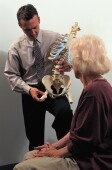 |
 |
 |

Fall Risk Higher in Older Women Who Sleep Less
And medications do little to influence the link, study finds|
|
HealthDay
By Robert Preidt
Monday, September 8, 2008
 MONDAY, Sept. 8 (HealthDay News) -- Getting five hours or less of sleep a night increases the risk of falls among women aged 70 and older, says a U.S. study.
MONDAY, Sept. 8 (HealthDay News) -- Getting five hours or less of sleep a night increases the risk of falls among women aged 70 and older, says a U.S. study.
It also found that the use of sleep medications doesn't seem to influence the link between amount of sleep and fall risk.
Researchers measured sleep, sleep efficiency (percentage of time in bed spent sleeping) and frequency of falls in 2,978 women aged 70 and older. The women averaged 6.8 hours of sleep per night and spent an average 77.2 minutes awake after initial sleep onset.
Overall, the average number of falls one year after the collection of sleep data was 0.84. But 549 (18.4 percent) of the women had two or more falls during that year. Women who slept five hours or less per night were more likely to have two or more falls than those who slept more than seven to eight hours a night.
The researchers found that women with a sleep efficiency of less than 70 percent were 1.36 times more likely to have a fall than women with a sleep efficiency of 70 percent or more. Women with 120 minutes or more of wake time after sleep onset were 1.33 times more likely to fall than those who were awake less than 120 minutes after sleep onset.
"In all, 214 subjects (7.2 percent) reported current use of benzodiazepines (hypnotic medicines used to treat insomnia). Use of any benzodiazepine (short and long combined) was associated with a 1.34-fold increased risk of falls, whereas short- and long-acting benzodiazepine use was associated with an increased odds of 1.43 and 1.18, respectively," wrote Katie L. Stone, of the California Pacific Medical Center Research Institute in San Francisco, and colleagues.
The study was published in the Sept. 8 issue of the Archives of Internal Medicine.
"Future studies, in particular randomized trials, are needed to determine the effects of newer pharmaceutical interventions for insomnia (e.g., benzodiazepine receptor agonists) or cognitive behavioral therapy for insomnia on risk of falls," the authors concluded. "In addition, future studies using comprehensive and objective measures of sleep should examine the interrelationships between specific sleep characteristics (e.g., sleep-related breathing disorder, hypoxia and measures of sleep duration and fragmentation) to determine if these disorders contribute independently toward risk of falls."
HealthDay
Copyright (c) 2008 ScoutNews, LLC. All rights reserved.
More News on this Date
Related MedlinePlus Pages:
| Home | Health Topics | Drugs & Supplements | Encyclopedia | Dictionary | News | Directories | Other Resources | |
| Disclaimers | Copyright | Privacy | Accessibility | Quality Guidelines U.S. National Library of Medicine, 8600 Rockville Pike, Bethesda, MD 20894 National Institutes of Health | Department of Health & Human Services |
Date last updated: 09 September 2008 |




